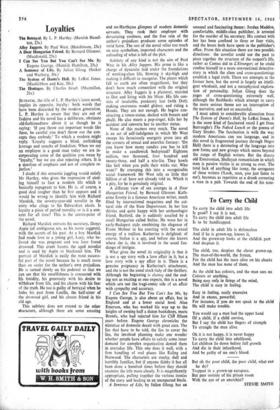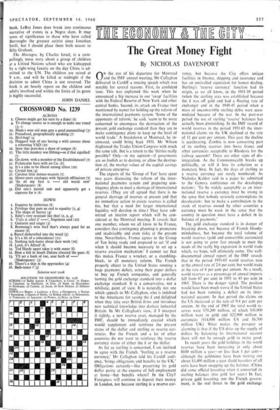Loyalties
Alley Jaggers. By Paul West. (Hutchinson, 25s.) A Dear Hungarian Friend. By Bernard Glemser. (Macdonald, 25s.) I Can See You But You Can't See Me. By Eugene George. (Hamish Hamilton, 25s.) A Sentence of Life. By Julian Gloag. (Seeker and Warburg, 30s.) The System of Dante's Hell. By LeRoi Jones. (MacGibbon and Kee, 30s.) The Hostages. By Charles Israel (Macmillan, 21s.) BETRAYAL, the title of L. P. Hartley's latest novel, implies its opposite, loyalty : both words that have been discarded by the modern generation. L. P. Hartley is aware that they are out of fashion and his novel has a deliberate, obstinate old-fashionedness about it as though he is saying: If you throw out important words like these, be careful you don't throw out the con- cepts they embody.' To which a modern might reply. 'Loyalty suggests a blind, unthinking homage and smacks of feudalism. When we say an employee is a good man today we are in- corporating some of the qualities you mean by "loyalty," but we are also rejecting others. It is a question of emphasis and not of complete re- jection.'
I doubt if this semantic juggling would satisfy Mr Hartley, who gives the impression of steel- ing himself to face a modern life which is basically repugnant to him. He is, of course, a good deal tougher than he first appears and it would be wrong to identify him with Richard Mardick, the seventy-year-old novelist in the story who clings to his Edwardian ideals. Is loyalty a piece of period morality or is it a con- cent for all time? This is the centre-point of the novel.
Richard Mardick entrusts his secretary, Denys Aspin (of ambiguous sex, as his name suggests), with the secrets of his past. As a boy Mardick had made love to a young girl, Lucy, who be- lieved she was pregnant and was later found drowned. This event haunts the aged novelist and is used by Aspin to blackmail him. The portrait of Mardick is easily the most success- ful part of the novel because he is much more than an outlet for the author's own prejudices. He is turned slowly on his pedestal so that we can see that his unselfishness is connected with his timidity, his generosity with his desire to withdraw from life, and his charm with his fear of the truth. He too is guilty of betrayal when he hides his past from Lucille, the half-sister of the drowned girl, and his closest friend in his old age.
This subtlety does not extend to the other characters, although there are some amusing and un-Hartleyan glimpses of modern domestic servants. They rook their employer with devastating coolness, and the free rein of the author's prejudices produces some episodes of vivid farce. The rest of the novel relies too much on easy symbolism, imported characters and the unloading of what is left of the plot.
Subtlety of any kind is not the aim of Paul West in his Alley laggers. His prose is like a charge of dynamite laid under the foundations of working-class life, blowing it sky-high and making it difficult to recognise. The pieces which fall to earth are often magnificent, but th6y don't have much connection with the original structure. Alley Jaggers is a plasterer, married to Dot and living with his Mum. His life con- sists of insatiable, predatory lust (with Dot); making enormous model gliders; and riding a Honda. They are not enough. He begins con- structing a totem-statue, decked with breasts and phalli. He also meets a pop-singer, kills her by accident and converts her to another statue.
None of this matters very much. The novel is an act of self-indulgence in which Mr West sweeps his ferociously energetic prose into all the corners of sexual and anarchic fantasy: `Do you know how many candles you has to kill to make a candlewick bedspread? Eighteen million, two thousand, four hundred and twenty-three, and half a nite-lite. They howls like hell when you pulls their wicks out. Who wunt?' By cramping this into a recognisable social framework Mr West tells us little that Sillitoe et al. have not already told us. Which is a pity, for he is genuinely original.
A different view of sex emerges in A Dear Hungarian Friend, by Bernard Glemser. Kath- erine Emory is a famous American writer, much feted by international magazines and the cul- tural side of the State Department. In her late thirties and quite happy with her archaeologist friend, Burford, she is suddenly assailed by a small Hungarian called Stefan. He woos her in early-Budapest style combining the elegance of Franz Molnar in his courting with the sexual energy of a stallion. Katherine is delighted; of course, Stefan is a spy, and before she knows where she is, she is involved in the usual fan- dango of intrigue.
What gives the novel its originality is that it is not a spy story with a love affair in it, but a love story with a spy affair in it. There is a genuine poignancy in Katherine's attachment, and she is not the usual stock-lady of the thrillers. Although the beginning is clumsy and the end- ing not as exciting as one expects, this is a novel which sets out the tragi-comic side of an affair with sympathy and accuracy.
I Can See You But You Can't See Me, by Eugene George, is also about an affair, but in England and at a lower social level. Alan Emerson, who has worked his way up to the heights of owning half a dozen bookshops, meets Brenda, who had rejected him for Cliff fifteen years before. Eugene George chronicles the minutiae of domestic deceit with great care. The lies that have to be told, the lies to cover the lies, the involved planning make one wonder whether people have affairs to satisfy some inner demand for complex organisation denied them in everyday life. This one does it well, with a firm handling of real places like Ealing and Norwood. The characters are stocky, dull and horribly familiar, but if anyone thinks it has all been done a hundred times before they should examine the title more closely. It is magnificently appropriate, pulling together the various ironies of the story and leading to an unexpected finale.
A Sentence of Life, by Julian Gloag, has an unusual and fascinating theme: Jordan Maddox, comfortable, middle-class publisher, is arrested for the murder of his secretary. His contact with her has been confined to three or four visits, and the hours both have spent in the publisher's office. From this situation there are two possible directions: the novelist could 'use the past to piece together the structure of the suspect's life, rather as Camus did in L'Etranger; or he could confine himself to a more conventional detective- story in which the clues and cross-questionings establish a legal truth. There are attempts at the former here, but the novel is largely an intelli- gent whodunit, and not a metaphysical explora- tion of personality. Julian Gloag does the pages of cross-questioning extremely well, although the flashbacks which attempt to carry the more serious theme are an interruption of the narrative, and not so successful I must admit to considerable alienation from The System of Dante's Hell, by LeRoi Jones. It is the same kind of fascinated recoil I get from Burroughs's The Naked Lunch or the poems of Gary Snyder. The fascination is with the way modern Americans can use language, and in this novel (a fragmented journey through Negro Hell) there is a detonating of the language into new forms and new groups which seems beyond the range of English 'writers. But the dreary old Emersonian, Shelleyan romanticism in which man is passive victim is as strong as ever. The total lack of anything like irony, the arrogance of these writers (Took, man, you just listen to me'), becomes as repetitive as a drunk cornering a man in a pub. Towards the end of his note-
book, LeRoi Jones does break into continuous narrative of events in a Negro slum. It may seem of significance to those who have called Burroughs the greatest satirist since Jonathan Swift, but I should place them both nearer to Billy Graham.
The Hostages, by Charles Israel, is a com- pellingly tense story about a group of children at a United Nations school who are kidnapped by a right-wing fanatic on the day China is ad- mitted to the UN. The children are seized at 9 a.m., and will be killed at midnight if the decision to admit China is not reversed. The book is an hourly report on the children and adults involved and within the limits of its genre is highly successful.
JOHN DANIEL



































 Previous page
Previous page